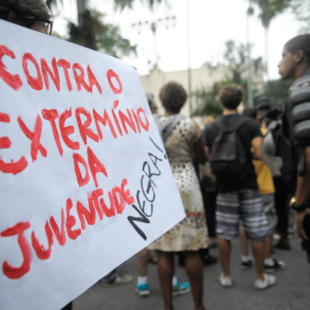16/11/2016 11:32
Brazil has only been free of slavery for less than a quarter of its entire history, and racism is still embedded in its culture and structures. Even the democracy in which we live, and for which we have fought so hard, especially in recent times, has never been a full democracy for Brazil’s black population. There is no real democracy in societies where relationships are built on racism and patriarchy.

Photo: Fernando Frazão/ Agência Brasil
Black people in Brazil are still denied the most basic of all rights, including the right to life, when a young black (man??) in Brazil is 2.5 times more likely to die violently than a young white (man??). The majority of women who are murdered are also black, and recent data shows the homicide rate against white women fell by 9.2%, but grew 54% against black women. One example of how black men and women are denied the right to quality health care is that over 60% of women who die while giving birth, from preventable and avoidable causes, are black. Blacks are denied the right to the city, due to explicit racial segregation in Brazilian cities. It is no coincidence that more blacks live in high-risk areas, with precarious services and extreme poverty, plus a long list of other constitutional rights that are violated every day for the black population.
That backdrop of inequalities also means that the role played by Brazil’s blacks in democratic forms of political representation – not just partisan politics, but in the broader sense of political activity – has historically been one of exclusion from decision-making power arenas. Positions of power, wealth and prestige are occupied overwhelmingly by white men. Even as black men and women have gained greater access to schooling, that progress is not the same in politics. Political parties from various inclinations still avoid letting black people run for important offices and provide little funding for their campaigns. Exceptions to this rule are rare.
If we look at democracy as participation in social movements, sharing in broader movements and political alliances, blacks are still mainly restricted to the movements’ “rank and file.” The majority of leaders are still white men. Representation matters, though, and black men and women ought to be everywhere, seen and respected for their skills and capacities.
In 2015, black women organized the year’s second largest street demonstration: the March of Black Women against Racism and Violence, and for Well-Being. The biggest event that year was the Margaridas’ March of peasant women, which took 70,000 people to Brasília, while the March of Black Women brought out 50,000. What has this meant for the people’s democratic movement? Are black women becoming more visible with the political strength they have shown over recent years?
In the context of post-coup Brazil, it is still significant that class domination has always been exercised through social relations. The rich always knew that to keep their power they must maintain the slave mentality perpetuated by this racist system. That has always been their strategy and shows how important structural racism is for them to stay in power. The racist nature of the coup cannot be downplayed as a “detail.”

Photo: Fernando Frazão/ Agência Brasil
Although the participation of blacks in Brazil’s style of democracy is still insufficient, however, we cannot give up what progress has been made in recent decades.
Brazil is now going through a period of setbacks and threats to all struggles for gender and racial equality and for the human rights and the dignity of all persons. Since before the coup, and even more afterwards, most of the Congressional agenda has focused on making labor relations more precarious, criminalizing social movements and setting back past progress on gender issues that directly affect the rights of women and of the black and LGBT population. Almost daily announcements of the elimination of social policies and programs foreshadow the defeat of many of the victories won in fights for racial equality and to reduce social inequalities.
Growing and explicit expressions of racial and class hate, misogyny and intolerance have intensified many forms of violence. This grave situation demands the firm resistance of all social movements, in an unflinching defense of democracy and of rights won in the past.
In this month of November, 2016, the affirmation of black awareness emerges from broader struggles for dignity and equity. Our name is resistance!
[1] Educator in FASE’s program in Pernambuco, and an activist in the State’s Black Women’s Network.
[2] Originally published in the Abong website.










